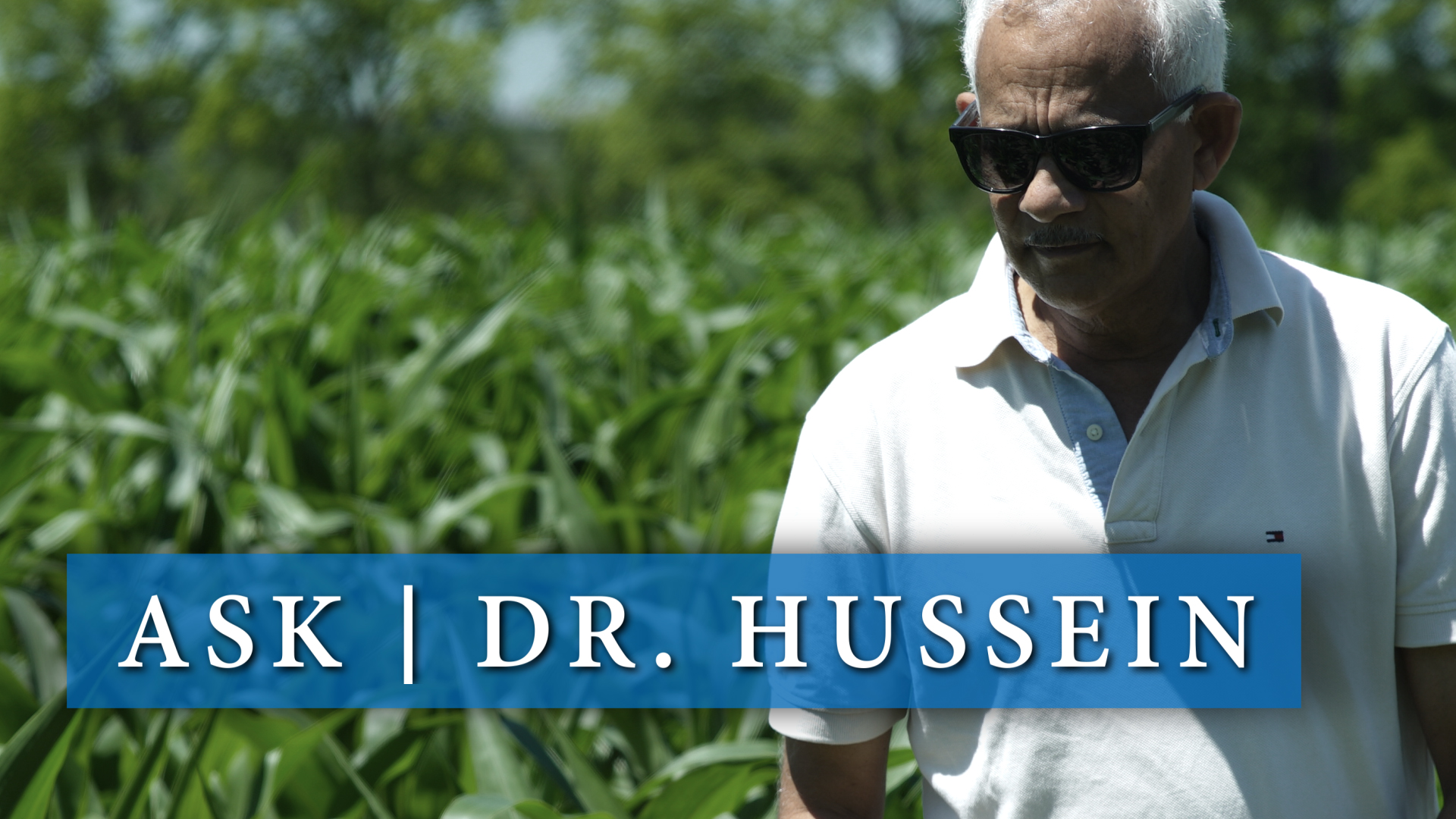ASK DR. HUSSEIN
ASK DR. HUSSEIN
We are excited to announce the launch of Ask Dr. Hussein channel. It is dedicated to answering questions often asked by the public. If you have any questions, please fill in the form above. We highly encourage to limit your questions to the field of agriculture and livestock. Due to the volume of questions that we generally receive, we will only select few that are relevant to the topic and matters for the people of Somalia.
The forum below allows individuals to leave comments, suggestions, and feedback. We highly encourage other experts in the field of agriculture to participate in responding to the inquiries left in the comments section.
Research Scientist (genetics and plant breeding)

General Agriculture topics
Is it lucrative to invest in somalia's agriculture sector?
DR. HUSSEIN (SOMALI)
Farsamo noocee ayaan isticmaali karnaa si loo celiyo horumarinta muuska?
DR. HUSSEIN (SOMALI)
WAA MAXAY DOORKA NGO-YADA EE SoOMAALIyA?
DR. HUSSEIN (SOMALI)
geedka loo yaqaano cali garoob ama garanwa muxu yahay?
MOHAMED MAYOW, MSc (SOMALI)
GMO (Genetically Modified Organism)
GMO GU MUXU YAHAY?
DR. HUSSEIN (SOMALI)
SATG MA ISTICMASHA GMO?
DR. HUSSEIN (SOMALI)
GMO GA FAA'IDO MU LEEYAHAY MISE QASARO?
DR. HUSSEIN (SOMALI)
SOMALIA DROUGHT CRISIS
ABAARAHA SOMALIA SIDE LOOGA BIXI KARA?
DR. HUSSEIN (SOMALI)
DROUGHT: STRATEGIES FOR MEDIUM AND LONG-TERM INTERVENTIONS
Somalia is a country prone to drought. In recent years the frequency and severity of drought is increasing, therefore, its important to take the following actions:
- Take the advantage of good years where the rainfall is high. This can be done in two ways: a) increase the production per unit area; b) increase the cultivation in the total land area.
- Use of varieties that are resilient to drought. Varieties that mature in short duration and resist more to drought. For example, Filsan Mungbean matures in 50 days.
- Use soil and water conservation technologies such as minimum tillage to reduce moisture loss from the soil. Drip irrigation is a good example of water conservation technology.
- Digging more wells and watersheds in addition to the use of water harvesting and water conservation technology.
- Grow fodder crops and introduce bailing technology to conserve fodder for a long period of time.
- Use of proper storage facilities to conserve both grain and fodder
- Early planting “Jilaal Dabow” and use of good agricultural practices such as timely weeding and crop rotation will make the crop to become more resilient to drought.

I am glad that Dr.Hussein has taken time out of his busy schedules and given us the opportunity to ask him questions. Your contribution to our homeland is highly appreciated. Thanks very much!
Iam asking Dr Hussein mostly the challenge of somali farmers is insects and i show a farm that cultivate water melon it attacks the insect and very damage the plant then my question is what’s the real solution that control that insect I need suitable control of this insect iam not need chemical control iam interesting biological control
Thanks
Insects and diseases are among the major constraints facing the Somali farmers. Solutions to the problem are many and among them are:
1. Clean your field from weeds that may attract insects to lay their eggs while waiting for the crop to emerge
2. Use good agriculture practices. Never plant watermelon in the same field for two consecutive seasons. Crop rotation reduces insect and disease population in the field
3. There are many biological control treatments available and among them is Neem Oil, extracted from GEED HINDI commonly grown in Somalia. Also a mixture of Geed Hindi (leaves and fruit extraction) hot papers and tobacco leaves serve as a good control measures against insects.
4. Follow the production guide of watermelon posted at SATG website. https://satg.org/training-modules/
Thank you So much Dr:Hussien.
We need your help.
#SomaliWillComebackSoon
So nice group thnk u for sharing us this information really i get more benefits thnk U again
asw
We would like to thank dr husein for his good work may allah reward him.
we would like to know if there is any operational and commercial assistant in operating sesame farm as we have a farm in janaale (ugunji) but we are in diaspora and we would like to come back and start this project and contribute to the country interms of economy and job creation, we need direction and advice in this matter any assistance will be greatly appreciated.
WSW
Dear Ahmad, please send your detailed inquiries to Dr.Hussein at info@satg.org
I would like to thank dr Husein for his good work may allah reward him.
Also i would like to thank SATG Group for their researches and trainers then i would like to ask Dr. Husein, as we know there is no seed production in Somalia, also there is no seed certification. and they are very important in to crop production so that is it possible to produce SATG certificate seeds specially cash crops ? . Thanks very much.
There is no certified seed currently produced in Somalia and there is no certification agency that looks after the seed. There are cases where seeds of various crop species are imported into the country and sometimes distributed to the farmers without prior testing for adaptation to the environmental conditions. Filsan which is the private arm of SATG is currently producing seed following international standards and is working closely with the Ministry of Agriculture to develop seed policy and regulations, which is a key to the seed certification process.
Hi
I mainly have 2 questions?
1) What can be cultivated in Somalia?
2) why cant The food production feed The whole country?
1. Somalia has a tropical climate which means temperature plays a major role on the type of crops that can be grown. In most parts of Somalia, maize, sorghum, cowpeas, munbeans, fruits and vegetables of tropical origin, are very popular. These crops have high adaptation to the climatic condition. Other crops of tropical origin can also be grown in Somalia. Some temperate crops like Irish potato, wheat, barley, etc. will likely grow and perform reasonably well in the highlands of Somalia,
2. The food production can only feed the country when a) the security and agriculture infrastructures are improved, b) the production per unit area is increased (for example, maize farmers are only producing 1 ton/ha whereas the potential exceeds 15 ton/ha), c) farmers get access to improved seed quality and inputs, d) the potential of the available arable land is fully and properly utilized and e) research and extension services are restored. Agriculture policy and regulations also plays an important role.
Dr . Hussein thanks , i havent any question but i wanna share with you my idea , let the Somali language be the language of questions and answers of this programme . Since it concern Somali Farmers and most of them don’t understand English well .
Thanks .
Inta badan dadka beerahooda soohinta wadaagaan waxaa lagula taliyaa in ay soohinta labada beerood lagu abuuro dalag isku mid ah , hadaba maxay tahay sababta ka dambeeysa arintaa ?
Soohiin(Borderline) waa xad kala saara laba beerood.
Beeraleyda casriga iyo kuwa qadiimiga ah, ma beertaan soohiinta beerta. Laakiin beeraleyda beerohooda isku dhow, wexeey beeran karaan dalag isku mid ah: si loo fududeeyo iskaashiga/iska warqabka iyo dhowritaanka dalagyada.
Waxa an kuwaydiin laha waxa lasheega in somalia ay leedahay afar xili oo ay wax beerato sida darteed qudaarta sedee ayey ugu kala baxdaa afartan xili
Qudarta xilli kast waa la beeran karaa, laakinse waxaa jirta in xilliyada qaar ay cudurada iyo cayayaanka gela qudaarta ay aan u badan yihiin. Taasna waxaa ugu wacan heel kulka iyo qoyaanka ku jira hawada (humidity). Beeraalayda qudaarta beerta waxay sii aad u tacbadaan qudaarta xilliga deyrta. Xilligaa waxaa hooseeya cudurada iyo cayayaanka. Ka hortagga cudurada iyo cayayaanka ayaa ah mid aad muhiim u ah marka la beeraayo qudaarta.
Dr. Hussein
Hello
This is great. However, Is there a plan to create another Monsanto of Somalia?
thank you
Hassan,
It appears you’re being sarcastic. Under what circumstances do you think Monsanto is being created in Somalia? SATG has been striving to revive the lost agricultural practices in Somalia and has shown many tangible results. Finally we are witnessing tremendous development in the agriculture sector. And you on the other hand compare these efforts with the most despised corporation in the world.
Asc Dr Hussien and satg filsan team, Dr Hussien suaasha aan qabo waxee tahy maadama aa tahy qof cilmiga beeraha u leh aqoon durgsan makugu jiraa fikir ah in aad cilmigaaga dadka kaa danbeeyo ama dhaliyarada soomaaliyeed ee baranayo kuliyada beeraha in aad uga dhigtid buugaag sare u qaadeyso wax barashadooda, ama aad u qabato seminaro aad cilmigaaga ugu faaiideyso dhalinyarada cilmi doonka ah?
mahadsanid
Taladaasi waa mid aad u wanaagsan oon taageerayo.
Xiligan waxaad mooda inuu Dr. Hussein ku mashquulsanyahay tababarka beeralayda.
Anigu intaa waxaan ku dari lahaa, inuu hawshaas kudaro tabar tababarayaal, iyo madax qabata hawsha tababarka beeralayda, si isagu markaa uu wakhti ugu heelo faafinta aqoonta dhinacwalba, ilaa theory iyo practice.
Hadaba taasi waa fikrad, Dr. Hussein wuxuu aad ugu mahadsanyahay hawsha muhiimka ah ee uu yaho. Soomaalinimada noocaas ah waa qariib xiligan
Asalamu aleykum to all
I’m really impressed with satg and it’s efforts
I’m living in Malaysia and I’m member of agriculture farm And I think it’s great we make connection between the two nations for a simple steps
south east asia countries would love to have somali products and we need their skill and equipment facilities in exchanges
Please contact me will love to discuss with you the marketing strategy that I’m offering
Like: New and used agriculture machinery
Free training courses provided by Malaysian universities
Hello Dr Hussein.. i’m so interested by the situation in Somalia and not only in Somalia but in all the poor countries facing agricultural problems, drought problems and starvation. I’m asking myself why not planting trees such as Acacia to fight drought problems. It can help the growth of vegetables, the renovation of the watercycle specially the groundwater, the quality of the soil.. All these will help to fight starvation in Somalia for example and not only starvation but helping people, espcially women to work and then feed their children. You can install or maximize the drip irrigation.. i know i’m not well informed in the agricultural section but i’m in my way, i’m a student (L3) in agronomic sciences at the Lebanese University of Lebanon, beyrouth. If i can help, please let me know.
Cutting acacia trees for charcoal production and export is one of the root causes of the recurrent drought in Somalia. The mismanagement of land, resulting in degradation and disturbances in the natural water cycle, has exacerbated food insecurity.
There are a number of organizations that are working on the restoration of agro-forestry in Somalia and among them is ICRAF (World Agroforestry Centre), who has currently signed an agreement with Puntland and Somaliland Ministries of environment, for planting trees in Somalia. Agroforestry involves deliberate and systematic integration of trees with crops and livestock, which is central to the sustainable management of land and maintenance of healthy landscapes. Puntland and Somaliland are the most affected and I hope the agreement signed with ICRAF will produce tangible results.
It is time to contemplate for a long term sustainable solution to the recurrent drought in Somalia. Introduction of climate smart agriculture technologies such as use of drought resistant and early maturing varieties, water conservation practices (drip irrigation) as well conservation agriculture (crop rotation, use of minimum tillage, etc.) are the basis for a long-lasting solution. However, for this to happen, it requires a long-term commitment from the government, development organizations, and communities affected by the drought.
Jazakallaah khayr dr xuseen allaah khayr haku siiyo waxaan aad u danaynayaa shaqo kusaabsan beertayda afgooye sida crops ciida baarideeda daawaynteeda iyo waxyaabo badan .waxaasoo dhan maqabataan mase jiraa meelo community farm somalidu kuwadaagaan warbixino kusaabsan beeraha iyo dalagyafa